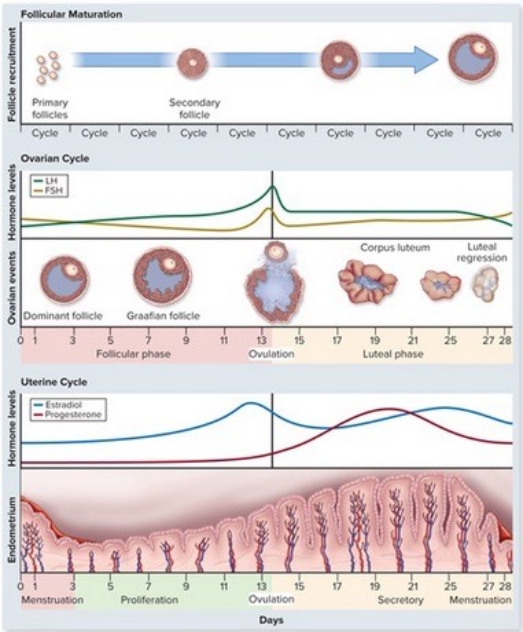Exam 51: The Reproductive System
Exam 1: The Science of Biology58 Questions
Exam 2: The Nature of Molecules and the Properties of Water76 Questions
Exam 3: The Chemical Building Blocks of Life74 Questions
Exam 4: Cell Structure63 Questions
Exam 5: Membranes76 Questions
Exam 6: Energy and Metabolism53 Questions
Exam 7: How Cells Harvest Energy59 Questions
Exam 8: Photosynthesis67 Questions
Exam 9: Cell Communication45 Questions
Exam 10: How Cells Divide62 Questions
Exam 11: Sexual Reproduction and Meiosis53 Questions
Exam 12: Patterns of Inheritance64 Questions
Exam 13: Chromosomes, mapping, and the Meiosisinheritance Connection58 Questions
Exam 14: Dna: the Genetic Material68 Questions
Exam 15: Genes and How They Work79 Questions
Exam 16: Control of Gene Expression62 Questions
Exam 17: Biotechnology48 Questions
Exam 18: Genomics52 Questions
Exam 19: Cellular Mechanisms of Development56 Questions
Exam 20: Genes Within Populations78 Questions
Exam 21: The Evidence for Evolution65 Questions
Exam 22: The Origin of Species67 Questions
Exam 23: Systematics,phylogenies,and Comparative Biology67 Questions
Exam 24: Genome Evolution54 Questions
Exam 25: The Origin and Diversity of Life35 Questions
Exam 26: Viruses62 Questions
Exam 27: Prokaryotes61 Questions
Exam 28: Protists55 Questions
Exam 29: Seedless Plants44 Questions
Exam 30: Seed Plants36 Questions
Exam 31: Fungi63 Questions
Exam 32: Animal Diversity and the Evolution of Body Plans42 Questions
Exam 33: Protostomes79 Questions
Exam 34: Deuterostomes83 Questions
Exam 35: Plant Form55 Questions
Exam 36: Transport in Plants51 Questions
Exam 37: Plant Nutrition and Soils47 Questions
Exam 38: Plant Defense Responses42 Questions
Exam 39: Sensory Systems in Plants50 Questions
Exam 40: Plant Reproduction86 Questions
Exam 41: The Animal Body and Principles of Regulation75 Questions
Exam 42: The Nervous System78 Questions
Exam 43: Sensory Systems88 Questions
Exam 44: The Endocrine System87 Questions
Exam 45: The Musculoskeletal System57 Questions
Exam 46: The Digestive System59 Questions
Exam 47: The Respiratory System54 Questions
Exam 48: The Circulatory System53 Questions
Exam 49: Osmotic Regulation and the Urinary System46 Questions
Exam 50: The Immune System49 Questions
Exam 51: The Reproductive System79 Questions
Exam 52: Animal Development69 Questions
Exam 53: Behavioral Biology91 Questions
Exam 54: Ecology of Individuals and Populations69 Questions
Exam 55: Community Ecology59 Questions
Exam 56: Dynamics of Ecosystems48 Questions
Exam 57: The Biosphere and Human Impacts41 Questions
Exam 58: Conservation Biology49 Questions
Select questions type
Internally fertilized organisms can either be born alive,or emerge from what structures?
Free
(Multiple Choice)
4.8/5  (32)
(32)
Correct Answer:
D
The sperm head encloses a compact nucleus and is capped by a vesicle called what?
Free
(Multiple Choice)
4.8/5  (36)
(36)
Correct Answer:
C
Vertebrates that practice internal fertilization employ three strategies for embryonic and fetal development.In one strategy,the female retains the young which develop and obtain nourishment from the female's blood.What is this called?
Free
(Multiple Choice)
4.7/5  (33)
(33)
Correct Answer:
C
Your friend is an amateur aquarist learning to breed clownfish.She had one successful clutch of eggs,and moved the mother and fry with their anemone to a separate tank leaving only male fish behind.Now,she is surprised to find that a new female fish has appeared in the original tank.What is the most likely explanation for this?
(Multiple Choice)
4.7/5  (37)
(37)
Choose the letter of the best match from the following:
-Prevention of embryo implantation.
(Multiple Choice)
4.9/5  (35)
(35)
Select the correct statement regarding the human female reproductive system.
(Multiple Choice)
4.8/5  (30)
(30)
 -According to the figure,what is the only hormone that doesn't peak during ovulation?
-According to the figure,what is the only hormone that doesn't peak during ovulation?
(Multiple Choice)
4.9/5  (34)
(34)
Choose the letter of the best match from the following:
-Sperm blockage.
(Multiple Choice)
4.7/5  (35)
(35)
What term describes avoidance of reproduction without giving up sexual intercourse?
(Multiple Choice)
4.8/5  (39)
(39)
Choose the letter of the best match from the following:
-Surgical intervention.
(Multiple Choice)
4.9/5  (30)
(30)
Which type of fish is likely to produce the smallest number of progeny from each mating?
(Multiple Choice)
4.8/5  (36)
(36)
Even if utilized properly,what is the least effective means of birth control?
(Multiple Choice)
4.8/5  (29)
(29)
Choose the letter of the best match from the following:
-Prevention of egg maturation and ovulation.
(Multiple Choice)
4.8/5  (36)
(36)
What could be the result if somehow two follicles made it to the late tertiary stage and burst from the ovary?
(Multiple Choice)
4.7/5  (33)
(33)
Showing 1 - 20 of 79
Filters
- Essay(0)
- Multiple Choice(0)
- Short Answer(0)
- True False(0)
- Matching(0)